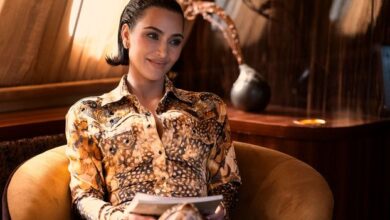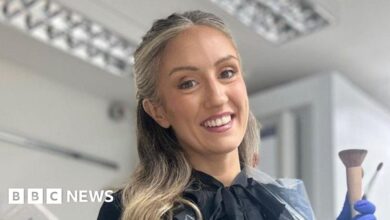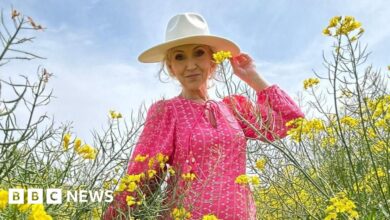‘She understands the spaces we’re trying to break into’
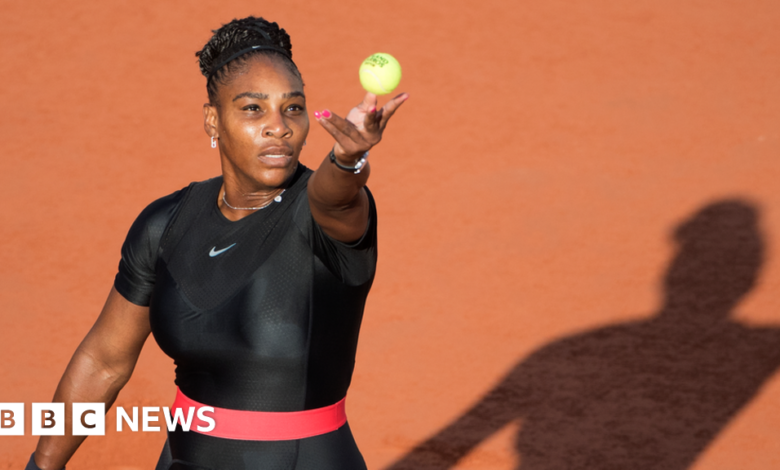
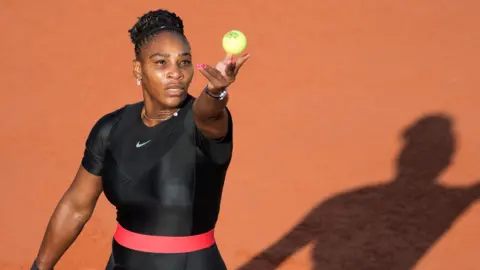 Getty Images
Getty ImagesSerena Williams is widely celebrated as one of the greatest tennis players of all time. Her achievements on the court are undeniable – 23 Grand Slam singles titles and a record-breaking $95 million in career-prize money, collected during a career spanning more than a quarter of a decade.
Williams made her professional debut in tennis in 1995, when she was just 14 years old. In August this year, she announced she would be “evolving away” from the sport, playing her last game at the 2022 US Open.
But Williams’ legacy is not confined to the court. From speaking up for equal pay, to drawing attention to black maternal mortality rates, and using her own wealth to empower marginalised female business owners, the tennis star is a fierce champion for women’s rights.
She has also cast her eye on new ventures, including publishing her first children’s book this September.
As Williams starts to make new moves, BBC 100 Women has spoken to girls and women whose lives have been inspired and sculpted by her enduring legacy.
‘It doesn’t feel real’
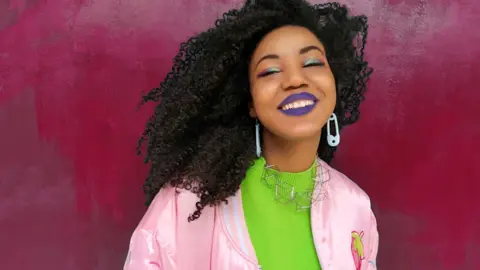 Christina Mallas
Christina MallasWilliams has recently turned her efforts to the literature world and written her first children’s book.
‘The Adventures of Qai Qai’ takes inspiration from the first black baby doll Williams gave to her daughter Olympia – a doll which has amassed hundreds of thousands of followers on Instagram since an account was set up for her in 2018, where the fictional character talks about mental health and race, among other issues.
Yesenia Moises, an illustrator raised in the Bronx, New York, was “flabbergasted” when she received an email asking her to work on the book.
“It still doesn’t feel totally real. Sometimes I pinch myself, and I’m like, ‘Did this really happen?'”, she says.
“I hadn’t really seen my art in that way before, as something that the greatest of all time tennis player could find first and foremost. I thought I was just putting art into the world and some people saw it, but not many.”
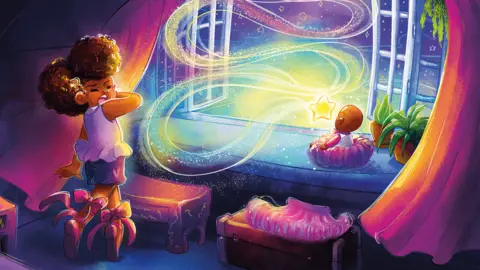 Feiwel & Friends
Feiwel & FriendsAs an Afro-Latina woman, Moises makes representation a priority in her work, portraying people of diverse backgrounds in fantasy and adventure stories. One of her own books, Stella’s Stellar Hair, empowers young girls to embrace their Afro-hair.
The 30-year-old says Williams played an important role in developing her own sense of self-acceptance.
“Growing up there was a point when I would just purely illustrate characters that didn’t look like me, and it wasn’t until I started making characters that look more like me that my career started taking off.
“Watching Serena has been such an amazing experience growing up as a child, especially because of how proudly she wears her hair.
“When she was younger she would wear the beads, the braids, and I thought that was really cool. In the 90s and early 2000s, that wasn’t really common because the image of a black person on TV was usually that of someone with straight hair or hair that looked a little tamer.”
Collaborating with an icon who had inspired some of her earlier work was ultimately “very humbling”, Yesenia says.
“It definitely has been very validating. I feel like a lot of artists deal with imposter syndrome further along in their career – they’re successful, but they still feel like tomorrow might be the day where it all ends. Working on this book, it feels like I am going somewhere in the world.”
‘She’s giving everyone fair play’
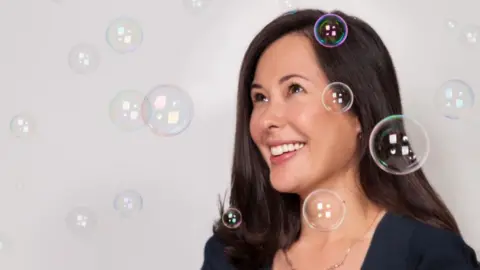 Billie
BillieGeorgina Gooley co-founded Billie, a US razor company that removes the ‘pink tax’ from its products – not a tax in the literal sense, it refers to how women-targeted products tend to cost more than similar products and services aimed at men.
The company started with a “vision”, but as Georgina says, they needed capital to “pour a little gasoline on” and grow the business.
The start-up soon caught the eye of Serena Williams’ investment fund, Serena Ventures.
“They were really early believers in Billie, and were willing to put their money where their mouth was,” Ms Gooley says.
“This was a really powerful signal. You have someone that’s done so many great things for women, and she believes in our company, and it aligns with her values and she’s willing to back it from a very early start – to get that positive reinforcement from such an important figure early on is incredible.”
That passion was a stark contrast to the “many investors”, in a largely male-dominated industry, who were less interested in funding a brand “that empowered women”, says the entrepreneur.
According to Serena Ventures, 53% of its investment portfolio have female founders.
“She’s a savvy businesswoman. She and her team are not just looking to make these token cheques to women. They’re looking for good businesses to invest in,” Georgina says.
“She’s giving everyone fair play, and she understands the spaces that we’re trying to break into.”
It is Williams’ own “grit and tenacity”, as Georgina puts it, that allows companies like hers to flourish.
“She transcends sports and is a role model for women everywhere,” she says.
‘I want to win Grand Slams’
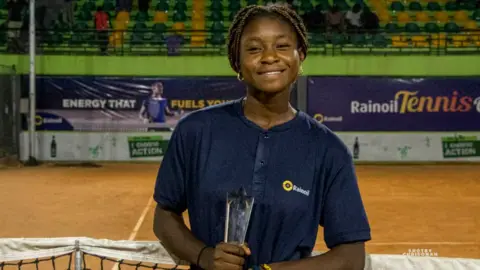 Eddy Edwards
Eddy EdwardsMarylove Edwards started playing tennis at the age of four.
Raised in Nigeria, her father introduced her to the sport early on, coaching her through her childhood years to national success.
By the age of eight, she had won her first tournament and was starting to attract attention.
But as Edwards explains, tennis is a “really expensive sport”, and role models who looked like her were few and far between.
That was, until she discovered the Williams sisters.
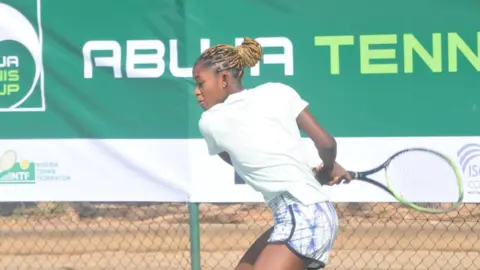 Eddy Edwards
Eddy Edwards“Tennis was mainly dominated by white people. But then watching Serena I was like: ‘Oh wow, that’s someone I look like.’ It’s inspiring,” she says.
Edwards continued to fight her way to the top of the game, and at the age of 16, was seeded Nigeria’s number one female tennis player.
“I got into the finals of a seniors tournament at just 13, so it really proved to them that I had something in me.
“Growing up, being a black lady, and watching Serena come from Compton, California, where there is basically nothing, and thinking that’s also the case here in Nigeria… she really gave me that courage that no matter where you’re from, you can definitely reach your goals if you believe in them.”
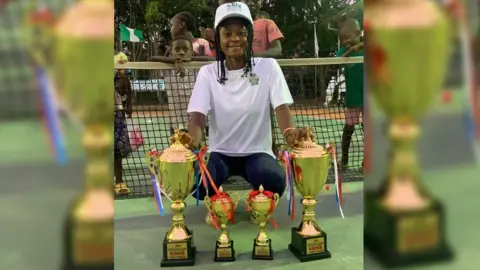 Eddy Edwards
Eddy EdwardsThe 17-year-old describes herself as a “power player”, a style she credits to the younger Williams sister.
It has even led her to being tipped the ‘Nigerian Serena’.
“I definitely want to win Grand Slams and be number one in the world just like her.
“To see her fight both on and off-the court, it shows she’s a really brave woman. Every young black lady will also want to grow and be powerful with their speech both on and off the court. So she’s just an all-rounded person, both inside and outside.”
Edwards points to the lasting effects of Williams’ career, recreated through generations by players like herself: “We didn’t really have a lot of kids wanting to play tennis, but then the more they saw a young girl like us playing, we definitely have more kids in Nigeria wanting to go to the top, wanting to go pro.”
Reflecting on her idol’s departure from professional tennis, she adds: “It’s the right time for her. It’s sad we’re not going to watch Serena Williams on our TVs anymore, but she has left a great legacy behind, so I will remember her forever.”




